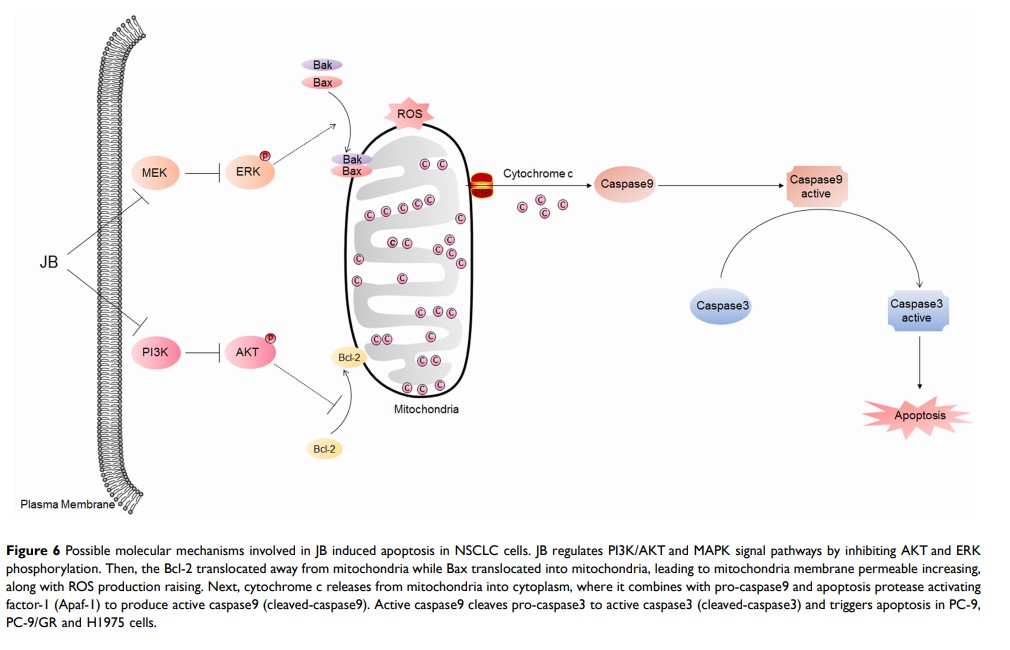109814
论文已发表
注册即可获取德孚的最新动态
IF 收录期刊
- 3.4 Breast Cancer (Dove Med Press)
- 3.2 Clin Epidemiol
- 2.6 Cancer Manag Res
- 2.9 Infect Drug Resist
- 3.7 Clin Interv Aging
- 5.1 Drug Des Dev Ther
- 3.1 Int J Chronic Obstr
- 6.6 Int J Nanomed
- 2.6 Int J Women's Health
- 2.9 Neuropsych Dis Treat
- 2.8 OncoTargets Ther
- 2.0 Patient Prefer Adher
- 2.2 Ther Clin Risk Manag
- 2.5 J Pain Res
- 3.0 Diabet Metab Synd Ob
- 3.2 Psychol Res Behav Ma
- 3.4 Nat Sci Sleep
- 1.8 Pharmgenomics Pers Med
- 2.0 Risk Manag Healthc Policy
- 4.1 J Inflamm Res
- 2.0 Int J Gen Med
- 3.4 J Hepatocell Carcinoma
- 3.0 J Asthma Allergy
- 2.2 Clin Cosmet Investig Dermatol
- 2.4 J Multidiscip Healthc

桔贝口服液(JuBei Oral Liquid )可诱导 NSCLC 细胞中线粒体介导的细胞凋亡
Authors Pan Z, Chen Q, Zheng X, Wang K, Duan Y, Xiao K, Jia Z, Ding X
Received 23 March 2020
Accepted for publication 10 July 2020
Published 31 July 2020 Volume 2020:13 Pages 7585—7598
DOI https://doi.org/10.2147/OTT.S254464
Checked for plagiarism Yes
Review by Single anonymous peer review
Peer reviewer comments 2
Editor who approved publication: Prof. Dr. Geoffrey Pietersz
Background: Although gefitinib brings about tremendous advances in the treatment of non-small cell lung cancer (NSCLC) harboring epidermal growth factor receptor (EGFR) mutations, most of patients become incurable due to drug resistance. JuBei oral liquid (JB) has been widely used to treat pneumonia in clinic. Components of JB were reported to induce apoptosis in NSCLC, which indicated that JB could be a potential antitumor agent for NSCLC patients. In this study, we investigated the effect of JB on gefitinib-sensitive PC-9 and gefitinib-resistant PC-9/GR, H1975 cells as well as its underlying molecular mechanisms.
Methods: PC-9, PC-9/GR and H1975 cells were treated with JB, LY294002, SCH772984, gefitinib alone or in combination. Then, cell viability, colony formation, cell death, expression of mitochondria-dependent pathway proteins, expression of EGFR, PI3K/AKT, MAPK signal pathway proteins, Bcl-2 mitochondrial translocation, ROS generation and cell apoptosis were examined by MTT, colony forming, live/dead cell staining, Western blot, immunofluorescence and flow cytometry assay.
Results: Our results showed that JB significantly induced cell growth inhibition and apoptotic cell death in PC-9, PC-9/GR and H1975 cells. JB activated mitochondria-mediated apoptotic pathway through inhibiting Bcl-2 mitochondrial translocation while inducing Bax translocated into mitochondria along with accumulated ROS production, thereby increasing the release of cytochrome c, subsequently cleaving procaspase9 into cleaved-caspase9 and then cleaving procaspase3 into cleaved-caspase3. Furthermore, the employment of protein kinase inhibitors LY294002 and SCH772984 revealed that the induction of mitochondria-mediated apoptosis by JB was reliant on inactivation of PI3K/AKT and MAPK signal pathways. Moreover, JB could synergize with gefitinib to induce apoptosis in PC-9, PC-9/GR and H1975 cells.
Conclusion: These data indicated that JB could be a potential therapeutic agent for NSCLC patients harboring EGFR mutations as well as those under gefitinib resistance.
Keywords: non-small cell lung cancer, gefitinib, resistance, JuBei oral liquid, apoptosis
